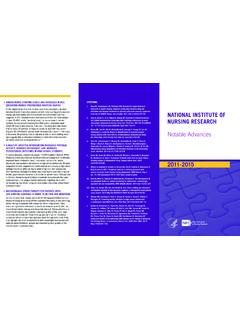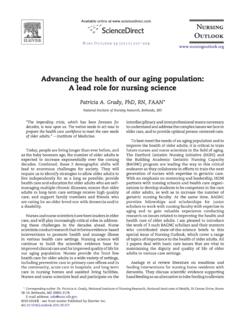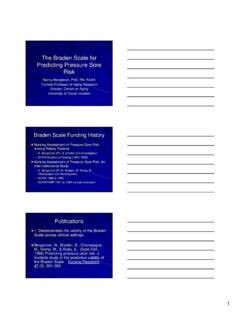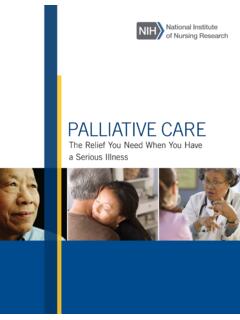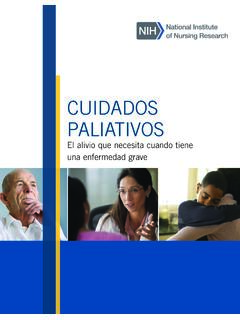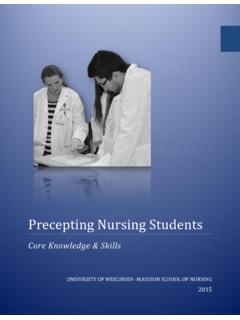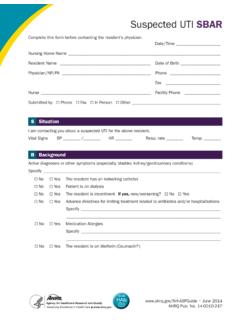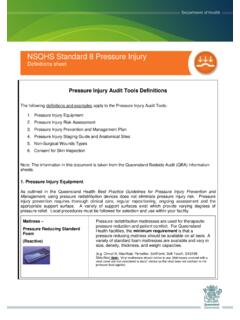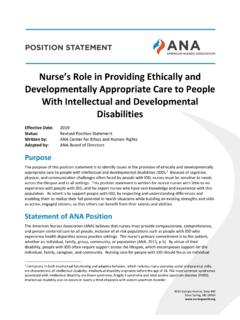Transcription of Advancing the health of our aging population: A lead role for …
1 Advancing the health of our aging population: A lead role for nursing sciencePatricia A. Grady, PhD, RN, FAAN*National Institute of nursing Research, Bethesda, MD The impending crisis, which has been foreseen fordecades, is now upon us. The nation needs to act now toprepare the health care workforce to meet the care needsof older adults. dInstitute of , people are living longer than ever before, andas the baby boomers age, the number of older adults isexpected to increase exponentially over the comingdecades. Combined, these 2 demographic shifts willlead to enormous challenges for society. They willrequire us to identify strategies to allow older adults tolive independently for as a long as possible; providehealth care and education for older adults who are self-managing multiple chronic illnesses; ensure that olderadults in long-term care settings receive high-qualitycare; and support family members and friends whoare caring for an older loved one with dementia and/ora , and will play increasingly critical roles in address-ing these challenges in the decades ahead.
2 Nursescientistsconductresearchthatinform sevidence-basedinterventions to promote health and manage illnessin various health care settings. nursing science willcontinue to build the scientific evidence base forimprovedclinicalcareandforimprovedqua lityoflifeforour aging population. Nurses provide the front linehealth care for older adults in a wide variety of settings,including preventive care in primary care offices and inthe community, acute care in hospitals, and long-termcare in nursing homes and assisted living and nurse scientists lead and participate on theinterdisciplinary and interprofessional teams necessarytounderstandandaddressthecomple xissueswefaceinelder care, and to provide optimal person-centered best meet the needs of an aging population and toimprove the health of older adults, it is critical to trainfuture nurses and nurse scientists in the field of Hartford Geriatric nursing Initiative (HGNI) andthe Building Academic Geriatric nursing Capacity(BAGNC)
3 Program are leading the way in this criticalendeavor as they collaborate in efforts to train the nextgeneration of nurses with expertise in geriatric an emphasis on mentoring and leadership, HGNI partners with nursing schools and health care organi-zations to develop students to be competent in the careof older adults, as well as to increase the number ofgeriatric nursing faculty. At the same time, BAGNC provides fellowships and scholarships for juniorscholars to work with nursing faculty with expertise inaging and to gain valuable experience conductingresearch on issues related to improving the health andhealth care of older adults. I am pleased to introducethe work of 3 such BAGNC scholars and their mentorswho contributed state-of-the-science briefs to thisspecial issue of nursing Outlook, which cover a rangeof topics of importance to the health of older adults.
4 All3 papers deal with basic care issues that are vital tomaintaining the dignity and quality of life of olderadults in various care et al review literature on mealtime andfeeding interventions for nursing home residents withdementia. They discuss scientific evidence supportinghandfeedingasanalternativetotu befeedingtoalleviate*Corresponding author:Dr. Patricia A. Grady, National Institute of nursing Research, National Institutes of health , 31 Center Drive, Room5B-10, Bethesda, MD - see front matter Published by Elsevier online at Outlook 59 (2011) difficulties, and they discuss implications forfuture research and policy. They note the importance ofinterdisciplinary and international efforts to developnew models of care. Talley et al review literature onconservative behavioral treatments and clinical guide-lines for managing and preventing urinary the literature is limited, data from multicomponentinterventions (eg, behavioral, exercise, biofeedback)show the strongest evidence for improving analysis also revealed that current clinical guide-lines are lacking specifically for frail community-dwelling older adults.
5 Toles and Anderson usecomplexity science as a framework for examining liter-ature on management strategies and practices innursing homes. They emphasize the importance ofdeveloping relationship-oriented management strate-gies and staff communications in nursing homes thatencourage interdependence among staff. In return,these strategies then allow staff to provide care neededtotreatcomplexhealthissuesinnursin ghomeresidents(eg, fall prevention).Collectively, these 3 papers address several impor-tant aspects of these health care challenges. First, thepapersfocus onidentifying ways to improve health careand quality of life for older adults across care settingsfrom the nursing home to the community, and theyhighlight the need for a strong scientific base ofresearch to inform clinical care guidelines. Second,these papers highlight the interpersonal interactions,either between older adults and family members ornursing staff, or among different levels of staff ina nursing home, which can influence older adults quality oflife and health -related outcomes.
6 Third,theseauthors identify the importance of nurses as integralmembers and leaders of interdisciplinary health careteams to solve complex health problems and providethe best health care for older adults. Finally, the papersunderscore the value in assessing multiple types ofintervention (eg, behavioral, medical, physical),analytical parameters (eg, interpersonal, organiza-tional, policy), and environmental settings (eg,community, long-term care) to fully understand thecomplexity of health issues facing older adults and toproduce the most positive health BAGNC scholars in geriatric nursing isa vital way in which the field of nursing contributes tobetter health for older adults. Clearly there are manychallenges ahead for nurses in both clinical care andresearch if we are to meet the needs of our agingsociety.
7 At the National Institute of nursing Research(NINR), we address these issues by supporting researchon a broad range of topics related to aging , includingself-management of chronic illness; support of familycaregivers; and improving the quality of care andquality of life for older adults in long-term care facili-ties. We also support scientists and nurse scholars atall career levels, from predoctoral students to seniorresearchers. Investing in research and training onaging and health ensures that nurses and nursescientists receive the support they will need to fulfilltheir responsibilities as leaders in meeting the chal-lenges of health care for our rapidly expanding we embrace our leadership responsibilities in theyears ahead, we should be mindful of several criticalhealth and health care challenges as well as the waysin which we can contribute to the solutions to Chronic IllnessesWe are living longer today, yet with increasing age, weare also more likely to live with chronic illness anddisability.
8 Current estimates indicate that approxi-mately 80% of people age 65 and older have at least 1chronic illness, such as heart disease, diabetes, orarthritis,1and that the number of older adults withmultiple chronic illnesses is chronicillnesses often involve pain, functional limitations, andthe need for long-term self-management of conditions not only impact the quality of life ofolder adults, but are also associated with considerableeconomic cost with estimates that 75% of health carecosts in the United States are the result of a time of dwindling resources, we will berequired to provide quality care to a larger numberof older adults with multiple health problems andcomplex health care needs. To address these issues inthe future, research should focus on older adults withmultiple chronic illnesses rather than just 1 illness, , as nurses we are in a unique position tocommunicate with older adults and their families abouteffective self-management strategies to maintain inde-pendence, functioning, and mental and physical Diversity of Older AdultsRacial and ethnic diversity is increasing in older adultsin the United States.
9 For example, current projectionsestimate that between 2010 and 2050 the percentage ofLatino older adults will increase from 7% to 20% in ourgeriatric a society, we must beprepared to provide services, programs, and interven-tions that are culturally sensitive and appropriate, andwhich are best designed to address this increasingdiversity. Here again, nurses and nurse scientists are atthe forefront of research efforts to inform the design ofprevention and health promotion interventions, toensure health equity, and to improve the health ofracially/ethnically diverse older adults. As a corollaryto this, we must also continue to invest in a geriatricNurs Outlook 59 (2011) 207e209208nursing and research workforce that is racially andethnically BurdenOur aging demographics also portend a significantincrease in caregiver burden for family and friends whoprovide care for older loved ones with physical disabilityand/or dementia.
10 For instance, in 2009 there wereapproximately million unpaid caregivers providingcare for loved ones with Alzheimer s into an estimated billion hours of statistics are likely to increase dramatically in thedecades ahead, and will lead to corresponding increasesin public health challenges because caregivers them-selves often experience higher incidences of disease anddisability. For example, informal caregivers often expe-riencestress,depression,andphysical illnessasthey carefor loved ones. Moreover, caregivers are often faced withdifficult decisions regarding placing loved ones in long-term care facilities. In the years ahead, we mustpay special attention to our roles in supporting familymembers and other caregivers as they navigatea complex health care system and make decisions aboutthebestcourseofcare;andnursingresea rchmustaccelerate our efforts to identify the best practices forproviding quality care for older adults and for supportingtheir families and other Collaboration and ResearchTranslationIt has become increasingly apparent that solutions to ourhealth and health care challenges require a collaborativeteamwork approach that is interdisciplinary and inter-professional.
